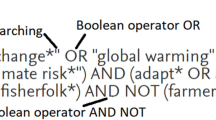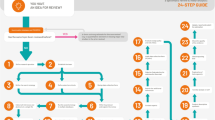Abstract
Checklists that focus attention on key variables might allow clinicians to find and fix their mistakes. However, whether this approach can be applied to clinicians of varying degrees of expertise is unclear. Novice and expert clinicians vary in their predominant reasoning processes and in the types of errors they commit. We studied 44 clinicians with a range of electrocardiography (ECG) interpretation expertise: novice, intermediate and expert. Clinicians were asked to interpret 10 ECGs, self-report their predominant reasoning strategy and then check their interpretation with a checklist. We found that clinicians of all levels of expertise were able to use the checklist to find and fix mistakes. However, novice clinicians disproportionately benefited. Interestingly, while clinicians varied in their self-reported reasoning strategy, there was no relationship between reasoning strategy and checklist benefit.

Similar content being viewed by others
References
Ark, T. K., Brooks, L. R., & Eva, K. W. (2006). Giving learners the best of both worlds: Do clinical teachers need to guard against teaching pattern recognition to novices? Academic Medicine, 81(4), 405–409.
Ark, T. K., Brooks, L. R., & Eva, K. W. (2007). The benefits of flexibility: The pedagogical value of instructions to adopt multifaceted diagnostic reasoning strategies. Medical Education, 41(3), 281–287.
Berbaum, K., Franken, E. A., Jr, Caldwell, R. T., & Schartz, K. M. (2006). Can a checklist reduce SOS errors in chest radiography? Academic Radiology, 13(3), 296–304.
Croskerry, P. (2003). Cognitive forcing strategies in clinical decisionmaking. Annals of Emergency Medicine, 41(1), 110–120.
Ericsson, K. (2004). Deliberate practice and the acquisition and maintenance of expert performance in medicine and related domains. Academic Medicine, 79(10), S70–S81.
Eva, K., & Cunnington, J. (2006). The difficulty with experience: Does practice increase susceptibility to premature closure. Journal of Continuing Education Health Professions, 26, 192–198.
Evans, J. (2010). Thinking twice: Two minds in one brain. Oxford: Oxford University Press.
Friedman, C., Elstein, A., & Wolf, F. (1999). Enhancement of clinicians: Diagnostic reasoning by computer-based consultation: A multisite study of 2 systems. JAMA, the Journal of the American Medical Association, 282(19), 1851–1856.
Gawande, A. (2009). The checklist manifesto: How to get things right. New York: Metropolitan Books.
Gegenfurtner, A., Lehtinen, E., & Säljö, R. (2011). Expertise differences in the comprehension of visualizations: A meta-analysis of eye-tracking research in professional domains. Educational Psychology Review, 23(4), 523–552.
Groopman, J. (2007). How doctors think. Boston: Houghton Mifflin Company.
Groves, M., O’Rourke, P., & Alexander, H. (2003). Clinical reasoning: The relative contribution of identification, interpretation and hypothesis errors to misdiagnosis. Medical Teacher, 25(6), 621–625.
Kahneman, D. (2011). Thinking, fast and slow. Toronto, ON: Doubleday.
Kulatunga-Moruzi, C., Brooks, L., & Norman, G. (2001). Coordination of analytic and similarity-based processing strategies and expertise in dermatological diagnosis. Teaching and Learning in Medicine, 13(2), 110–116.
O’Keefe, J., Hammill, S., Freed, M., & Pogwidz, S. (2010). The ECG criteria book (2nd ed.). Sudbury: Jones and Bartlett Publishers.
Patel, V., & Groen, G. (1991). The general and specific nature of medical expertise: A critical look. In K. Ericsson & J. Smith (Eds.), Toward a general theory of expertise: Prospects and limits (pp. 93–125). Cambridge: Cambridge University Press.
Sibbald, M., & De Bruin, A. B. (2011). Feasibility of self-reflection as a tool to balance clinical reasoning strategies. Advances in Health Science Education,. doi:10.1007/s10459-011-9320-5.
Sibbald, M., de Bruin, A. B., Cavalcanti, R. B., & van Merrienboer, J. G. (2013a). Do you have to re-examine to reconsider your diagnosis? Checklists and cardiac exam. BMJ Quality Safety, 22(4), 333–338. doi:10.1136/bmjqs-2012-001537.
Sibbald, M., de Bruin, A. B., & van Merrienboer, J. J. G. (2013b). Do checklists improve experts’ diagnostic decisions? Medical Education, 47(3), 301–308.
van Merrienboer, J. J. G. (1997). Training complex cognitive skills: A four-component instructional design model for technical training. New Jersey: Educational Technology Publications.
Acknowledgments
M.S. received support for this work from the Ho Ping Kong Center for Excellence in Education and Practice and the Peter Munk Cardiac Center, University Health Network.
Author information
Authors and Affiliations
Corresponding author
Rights and permissions
About this article
Cite this article
Sibbald, M., De Bruin, A.B.H. & van Merrienboer, J.J.G. Finding and fixing mistakes: do checklists work for clinicians with different levels of experience?. Adv in Health Sci Educ 19, 43–51 (2014). https://doi.org/10.1007/s10459-013-9459-3
Received:
Accepted:
Published:
Issue Date:
DOI: https://doi.org/10.1007/s10459-013-9459-3




